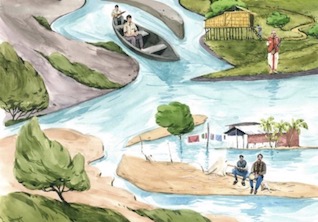Find this and other speeches by the President of India | National development and the development of tribal communities are linked to each other >>
I am glad to be participating in the Human Rights Day celebration organised by the National Human Rights Commission. It is an important occasion for the whole of humankind, as it was on this day in 1948 that the United Nations General Assembly adopted the Universal Declaration of Human Rights, also known as UDHR. […]
Climate change is knocking on the doors. People in the poorer nations are going to pay a heavier price for the degradation of our environment. We must consider the environmental dimension of justice now.
The challenge of climate change is so enormous that it forces us to redefine ‘rights’.
Five years ago, as you know, the High Court of Uttarakhand held that the Ganga and Yamuna rivers have the same legal rights as human beings. But why stop at only two rivers? India is a land of sacred geography, with countless holy lakes, rivers and mountains. To these landscapes, the flora and fauna add rich biodiversity. In old times, our sages and seers saw them all as part of a universal whole, along with us. So, just as the concept of human rights exhorts us to consider every human being as no different from us, we should treat the whole living world and its habitat with respect.
I wonder what would the animals and trees around us tell us if they could speak. What would our rivers say about human history and what would our cattle say on the topic of human rights. We have trampled on their rights for long, and now the results are before us. We must learn – rather re-learn – to treat nature with dignity. This is not only a moral duty; let us remember it is necessary for our own survival too.
Source: “ADDRESS BY THE PRESIDENT OF INDIA, SMT DROUPADI MURMU ON THE OCCASION OF HUMAN RIGHTS DAY CELEBRATION ORGANISED BY THE NATIONAL HUMAN RIGHTS COMMISSION” (New Delhi : 10.12.2022)
URL: https://www.presidentofindia.gov.in/speeches-detail.htm?993
Date Visited: 14 December 2022
[Bold typeface added above for emphasis]
“The Hindu Kush-Himalayan region holds the third largest body of frozen water in the world, and is warming at double the global average. It stands to lose one third of its glaciers by 2100 – creating huge risk to mountain communities, ecosystems and nature and the quarter of humanity downstream.” – Deepshikha Sharma (climate and environment specialist at the International Centre for Integrated Mountain Development, ICIMOD) quoted by BBC Podcast “The Climate Question” | Learn more | Biodiversity and development – Himalaya >>

As the mighty river flows, so does the natural music of the pain of environmental change. […] Songs have always chronicled social, political, historic, geographical, cultural and environmental change. Many popular singers have responded to the climate crisis. | The Changing Climate In The Songs Of The Brahmaputra (The Wire) | United Nations on climate change >> >>
Learn more from Mari Thekaekara >>
Are the ‘goods’ and ‘bads’ of physical events such as global warming equally distributed? Are there proper climate governance mechanisms sensitive to differentiated responsibility and risks, mitigated justly for suffering marginalised communities? | Read “Climate Justice: India Is Disproportionately Endangered – as Are Some Indians” on Mongabay | Learn more about climate change | United Nations on climate change >>